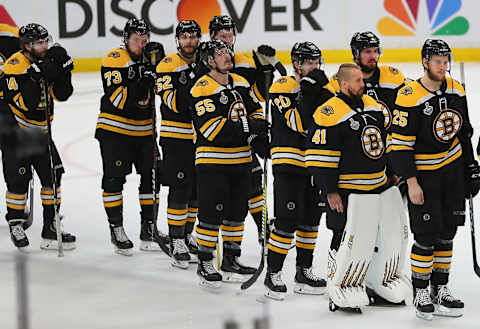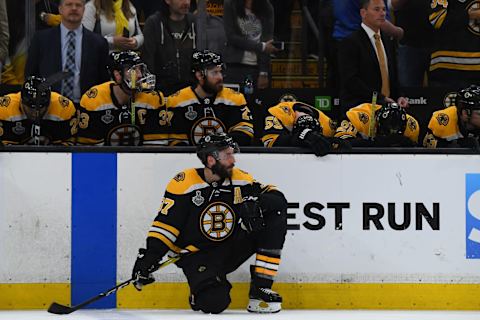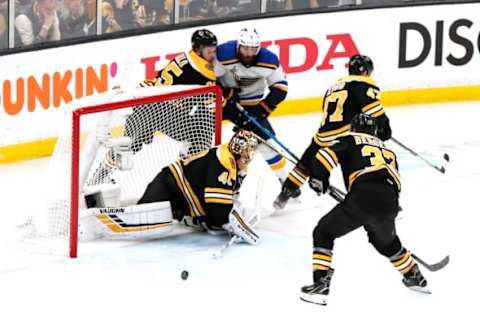The Boston Bruins blew the chance to become a dynasty


After winning the Stanley Cup in 2011, the Boston Bruins had numerous chances to form a dynasty. But at this point, it looks like they’ve run out of time to win more championships with this core.
In the ’90s and early 2000s, teams like the Detroit Red Wings and Colorado Avalanche easily formed super teams by attracting many of the top free agents. All-Star players went to those clubs (think Brett Hull, Luc Robitaille, Paul Kariya, Teemu Selanne, et al) in order to compete for Stanley Cups. The Boston Bruins nearly became one of those teams.
But here we are in the midst of 2019. The St. Louis Blues closed out the 2010s as the final Stanley Cup champion of the decade. And with that, the 2010s shall be remembered as an era where two teams pulled off improbable dynastic runs in an ultra-difficult salary cap era.
More from Puck Prose
- Detroit Red Wings 2023 Rookie Camp Has Plenty of Ups and Downs
- This Columbus Blue Jackets rookie doesn’t want to be forgotten
- 2 trades the Boston Bruins must make to secure the Stanley Cup
- 3 reasons the Avalanche won’t win the Stanley Cup in 2024
- This is a big year for Alex Turcotte and the Los Angeles Kings
The Chicago Blackhawks won the Stanley Cup in 2010, then another in 2013. Finally, they became a dynasty after winning it for the third time in 2015. The Pittsburgh Penguins (who won the Stanley Cup in 2009), followed suit by winning back-to-back championships in 2016 and 2017. Now, we had two dynasties.
The Los Angeles Kings (winners in 2012 and 2014) failed to win one more, but it’s amazing to think that we were this close to seeing three different NHL dynasties in the 2010s. But the Kings will not complain about “only” winning two Stanley Cups.
That brings us to the Bruins, who ended a 39-year Stanley Cup drought in 2011 when they defeated the Vancouver Canucks in seven games. But even before their championship journey was completed, Boston had botched numerous attempts to bring the Stanley Cup back to Beantown.
They were the top seed in the East with 116 points in the 2008-09 season. Boston finished second in goals for (274) while allowing the fewest (196). Tim Thomas won the Vezina, while Zdeno Chara took home the Norris Trophy.
And yet, the dream season ended when the Bruins fell to the sixth-seeded Carolina Hurricanes in the second round, losing on a Game 7 overtime goal from Scott Walker. A year later, the Bruins advanced to the second round and led the Philadelphia Flyers 3-0 in their best-of-seven.
The Flyers rallied to win three straight and forced a seventh game. Boston jumped out to a 3-0 lead, but the Flyers scored four unanswered goals to pull off the remarkable comeback.
Once again, Boston’s championship celebration was on hold, as they dealt with the embarrassment of blowing a 3-0 series lead. They learned from it after defeating Vancouver in 2011 to win it all. The first championship is always the most satisfying, but at the time, it was easy to believe the Bruins were capable of winning more with the same group.

Lost opportunities
Entering their 2011-12 title defense season, the Bruins core remained fairly young. Patrice Bergeron had just turned 26. Brad Marchand and Milan Lucic were both 23. Tyler Seguin was turning 20 in January. David Krejci was 25. Nathan Horton was 26. Chara was 34 but showing zero signs of slowing down. Thomas (37) was nearing the end of his run, but a 24-year-old Tuukka Rask was waiting to eventually take over as the starter.
The Bruins won their second straight Northeast Division title with 102 points, good for the No. 2 seed in the Eastern Conference. However, they were upset by the Washington Capitals in the opening round of the playoffs.
Joel Ward scored the overtime winner in Game 7 to put Boston’s potential dynasty on hold. Losing to a major underdog obviously hurt the Bruins, but they had all the right pieces in place to win another championship in 2012-13.
In a lockout-shortened 48-game season, Boston locked down the fourth seed in the East. They pulled off a thrilling comeback against the Toronto Maple Leafs in Game 7 of the opening round. Then they pummeled the New York Rangers in round two, before sweeping the top-seeded Penguins in the Eastern Conference Final. That set the stage for a showdown with the Blackhawks for the Stanley Cup.
Related Story. 3 Free Agents The Bruins Must Sign This Offseason. light
So, what happened? The Bruins fell 3-2 in the series and headed back to TD Garden in Game 5. They led 2-1 with less than 90 seconds to play. Bryan Bickell tied the game with 1:16 left. 17 seconds later, Dave Bolland shocked all of Beantown by scoring the game-winning goal. With that, the Bruins missed out on a potential Game 7. Once again, their bid at a second championship with this star-studded core went on hold.
That would be as close as the Bruins would come for a while. The next five seasons were full of frustration:
- 2013-14: The Bruins won the Presidents’ Trophy with 117 points, but they lost a tight seven-game series to the arch-rival Montreal Canadiens in round two. The series ended with a heartbreaking 3-1 loss on home ice.
- 2014-15: The Bruins drop their final three games to finish with 96 points, two behind the eighth-seeded Penguins.
- 2015-16: Boston drops nine of their final 12 games to miss out on the postseason. It concludes with an ugly 6-1 home loss to the lowly Ottawa Senators.
- 2016-17: The Bruins finish third in the Atlantic Division with 95 points, but the Senators eliminate them in six games. All six contests were decided by one goal, and four went into overtime. This was a series that the Bruins had every chance to win.
- 2017-18: A hot second half earns Boston 112 points, and they finish second in the Atlantic. After getting through Toronto in a close seven-game series, the Bruins bow out to the top-seeded Tampa Bay Lightning in five games.
This season, propelled by an improbable 19-game point streak, the Bruins finished with 107 points to earn the second seed in the Atlantic. Same old song and dance. They polish off Toronto in the first round. With Washington, Pittsburgh and Tampa Bay all eliminated in round one, the path is there for Boston to win the east.

Last chance for a dynasty
The Bruins got through a pesky Columbus Blue Jackets team in round two, then swept the Hurricanes to reach the Stanley Cup Final, where they met St. Louis. If Boston still had “dynasty status” on their minds, this was the chance to keep it alive. Bergeron (34 this offseason) Marchand (turning 31), Chara (42), Rask (32), and Krejci (33) aren’t going to be in their primes much longer.
The Bruins had the Blues on ice after taking a 2-1 series lead, but they lost the next two games. With their backs against the wall, Boston embarrassed St. Louis 5-1 in Game 6 to force a decisive game at TD Garden. This was their series to win.
But Blues goalie Jordan Binnington stood on his head and turned away a plethora of Boston scoring chances. Ryan O’Reilly opened the scoring late in the first period by tipping in Jay Bouwmeester‘s point shot. In the waning seconds of the period, Alex Pietrangelo scored a beautiful goal (thanks to a defensive lapse by Marchand), that made it 2-0. After that, you just got the feeling that the Blues were going to hold on.
St. Louis gave Boston very little in terms of passing lanes and quality scoring chances in the second period. Goals from Brayden Schenn and Zach Sanford late in the third put the game on ice. Matt Grzelcyk broke the shutout late, but it was too late. The Blues won 4-1 and captured their first Stanley Cup in franchise history.
Given the age of the core players, and a lack of cap space, it’s safe to say this was Boston’s last great chance to win in the Bergeron-Marchand-Rask-Chara era. No wonder they were visibly emotional after the loss, knowing that they lost out on a primary opportunity to win a second championship.
The Maple Leafs, Lightning and Canadiens — Boston’s primary divisional foes — all have younger core players in or just entering their primes. For all we know, the Bruins won’t even be a top-three team in the division next year.
Winning the Stanley Cup is hard enough. Getting there is easier said than done. Everything went right for the Bruins in the spring, and they couldn’t capitalize on it. Who knows when they’ll get back here again?
Game 7 of the 2019 Stanley Cup Final may be the most painful loss in Bruins history. But it’s only one of the 10 or so instances where this team blew the chance to be a dynasty. Yes, we’ll remember the 2011 Stanley Cup champion Bruins.
Next. Every NHL team’s greatest player of all-time. dark
But this team, in this era, will be overshadowed by the Blackhawks and Penguins. After all, those two teams capitalized on the opportunities and came away with three Stanley Cups apiece. The Bruins, however, weren’t able to take advantage of all these moments. And it cost them the chance to join their neighbors, the Boston Red Sox and New England Patriots, as a dynasty in the 21st century.